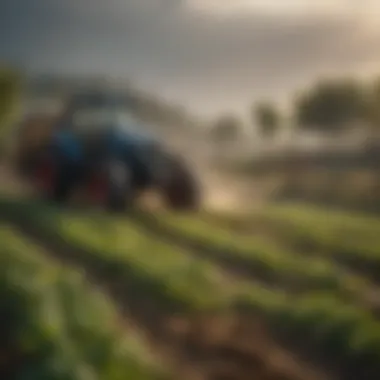Understanding the Role of Oce Com in Modern Agriculture


Intro
This article explores the concept of Oce Com in detail, illuminating its significance within the agricultural sector. With the growing demand for sustainable farming and community engagement, it becomes essential to understand how Oce Com operates and its potential influence on modern agricultural practices.
Key Concepts and Terminology
Basic Definitions
Oce Com, or Online Community of Agriculture Professionals, refers to a digital platform where farmers, researchers, and enthusiasts share knowledge, tools, and resources concerning farming practices. This connection promotes collaboration, which is essential for developing innovative farming solutions.
Historical Context
The idea of agricultural communities is not new. For centuries, farmers have worked together, sharing insights and practices. However, the digital age has transformed these methods. Oce Com leverages technology to bridge gaps between traditional practices and modern advancements. Understanding this evolution helps appreciate its current relevance.
Recent Innovations and Trends
Technological Advancements
Recent years have introduced numerous technological innovations to Oce Com. Tools like precision agriculture, data analytics, and mobile applications have reshaped interactions. Technology allows real-time data sharing, enhancing decision-making processes on farms. This creates a feedback loop where farmers can quickly adapt to challenges and opportunities.
Sustainable Practices
Sustainability remains a critical focus within agriculture. Oce Com facilitates conversations around sustainable techniques. Members share strategies that reduce waste and improve eco-friendliness in farming, such as organic farming methods and integrated pest management. The aim is to ensure that agriculture remains viable for future generations.
Practical Applications and Techniques
Step-by-step Guides
Understanding Oce Com's functionality requires practical insights. For instance, participating in forums is an effective way to learn. Farmers can ask questions or share experiences. This instant feedback fosters deeper understanding. Regular engagement enhances knowledge retention and application.
Case Studies
Many success stories exist within Oce Com communities. One notable example is the use of shared data among farmers in a region to monitor soil health. By comparing results, they have improved crop yields significantly. These case studies provide concrete examples of Oce Com's potential impact on farming.
"Oce Com is not just about sharing: it is about shaping the future of agriculture through collective knowledge and practice."
Prolusion to Oce Com
Exploring Oce Com reveals its importance in modern agriculture. The platform serves as a bridge, connecting farmers, researchers, and agricultural enthusiasts. This synergy fosters a community that enhances farming practices and encourages knowledge sharing. Understanding how Oce Com functions offers valuable insights into its scope and historical context.
Definition and Scope
Oce Com refers to a comprehensive communication network designed specifically for the agricultural sector. It facilitates the flow of information among various stakeholders. These stakeholders include farmers, agricultural scientists, and service providers. Its primary focus is to enhance agricultural practices. By providing a reliable means of communication, Oce Com enables the quick dissemination of information regarding best practices, market trends, and emerging technologies. The scope of Oce Com encompasses various areas including crop management, sustainable agriculture, and community engagement.
Key benefits of Oce Com include:
- Improved Communication: Provides a platform for farmers to communicate with each other and with experts.
- Access to Resources: Offers farmers access to educational materials and tools that can enhance their farming practices.
- Collaboration Opportunities: Encourages teamwork among different players in the agricultural sector to address common challenges.
Historical Background
The roots of Oce Com trace back to the early days of agricultural advancements and the need for farmers to stay informed. Historically, farmers relied on local networks and informal channels for information sharing. As agriculture evolved, so did the demand for a more structured and efficient communication system.
In the late 20th century, the rise of technology played a crucial role in shaping Oce Com. The introduction of the internet revolutionized access to information, leading to the development of various online platforms focused on agriculture. Oce Com emerged from this evolution as a specialized tool tailored for agricultural needs. Its growth has been marked by continuous innovation, adapting to the changing landscape of farming and technology.
"The advancement of communication tools has transformed agriculture, allowing for real-time exchange of critical information."
As the agricultural industry continues to face new challenges, Oce Com stands out as a necessary tool for progress. Understanding its history helps us appreciate its current role in transforming agricultural practices.
The Functionality of Oce Com
The functionality of Oce Com is essential for understanding its application in agriculture. This technology integrates various components that significantly improve farming efficiency and sustainability. A well-coordinated system allows farmers to engage with other agricultural stakeholders seamlessly.
Core Features


Oce Com comprises a range of core features that support farmers in their daily operations. This includes:
- Real-Time Data Collection: It provides farmers with instant access to critical information about weather conditions, soil quality, and crop health.
- User-Friendly Interface: The platform is designed to be intuitive and accessible, even for those with limited technological expertise.
- Mobile Compatibility: Oce Com is accessible on various devices, enabling farmers to monitor and manage their farms remotely.
Collectively, these features lead to informed decision-making. They help farmers optimize resource use, ultimately enhancing productivity and sustainability. For example, real-time data can inform irrigation practices, reducing water waste and promoting healthier crops.
Operational Mechanisms
Understanding how Oce Com operates is vital for recognizing its value. The platform is built around key operational mechanisms that facilitate its functionality:
- Data Integration: Oce Com collects data from different sources. Sensors in fields measure soil nutrients and moisture levels, which the system compiles for analysis.
- Analytics and Reporting: It offers analysis tools that provide insights into farming practices. Farmers can track historical data to identify trends and make projections for future yields.
- User Engagement: The platform encourages active participation among users. Farmers can share their experiences and solutions, creating a community of learning.
"The integration of technology in agriculture is not just a trend; it is the future of sustainable farming."
The successful utilization of Oce Com can create a significant impact, enhancing the way farming operations are conducted.
Oce Com and Agricultural Practices
Oce Com plays a pivotal role in revolutionizing agricultural practices today. Its integration into farming has changed the landscape, offering innovative solutions that enhance productivity and efficiency. By harnessing the capabilities of Oce Com, farmers can adopt advanced techniques that respond to the ever-evolving demands of agriculture. This allows the sector to meet challenges head-on while fostering sustainability and growth.
Impact on Farming Techniques
The adoption of Oce Com technologies leads to various improvements in farming methods. It facilitates precision agriculture, where data-driven insights enable farmers to optimize inputs such as seeds, fertilizers, and water. This means farmers can apply resources where they are most needed, reducing waste and maximizing yields.
Additionally, the technology supports automation in farming operations. For instance, robotic systems and drones are increasingly used for planting, monitoring crops, and harvesting. Such advancements contribute to significant labor savings and increased operational efficiency.
Moreover, farmers can utilize Oce Com applications to analyze environmental conditions. This data collection improves decision-making regarding crop rotation, pest management, and soil health. The incorporation of real-time data can lead to proactive adjustments in farming practices, potentially transforming yields.
"Oce Com enables a seamless blend of technology and tradition, ensuring that farmers remain competitive in a fast-paced world."
Enhancing Crop Management
Effective crop management is essential for successful agriculture, and Oce Com excels in this area. Farmers who embrace Oce Com solutions can access comprehensive tools for monitoring crop health and growth. This can involve the use of sensors and satellite imagery to assess whether crops are thriving or facing stress due to pests or moisture deficiency.
By utilizing such technology, farmers can implement targeted interventions. If a field shows signs of nutrient deficiency, appropriate fertilizers can be applied precisely to that section, rather than uniformly across the entire field. This capability not only improves crop performance but also contributes to resource conservation.
In terms of forecasting, Oce Com can provide predictions based on historical climate data and current trends. This foresight allows farmers to plan their planting schedules more accurately, mitigating risks associated with unpredictable weather patterns.
Sustainability through Oce Com
Sustainability is a vital concept in modern agriculture, affecting how farmers approach crop production, resource utilization, and community interaction. Oce Com enhances sustainability through improved methodologies and technologies, allowing for better tracking of resource usage, ecological impact, and overall farm productivity. This section highlights important elements of sustainability as influenced by Oce Com, showing how it contributes to the landscape of farming.
Promoting Sustainable Practices
Sustainable practices in agriculture not only focus on productivity but also minimize negative environmental impacts. Oce Com promotes these practices by facilitating access to information and resources that encourage environmentally friendly farming. Educational initiatives, seminars, and workshops offered through Oce Com generate awareness about sustainable techniques like crop rotation, organic farming, and integrated pest management. These practices are essential for preserving soil health, reducing chemical runoff, and promoting biodiversity.
By fostering an understanding of sustainability among farmers, Oce Com creates a platform where knowledge and best practices can be shared readily. Some benefits include:
- Improved soil quality through natural fertilization methods.
- Reduced water usage through efficient irrigation techniques.
- Decreased dependence on synthetic pesticides and fertilizers.
Resource Management Strategies
Resource management is a critical aspect of sustainable agriculture. Oce Com provides tools and strategies to help farmers manage their resources wisely. This involves monitoring inputs like water, seeds, and fertilizers.
One effective strategy is the use of data analytics, which helps farmers assess their resource needs accurately. By analyzing trends and outcomes, farmers can optimize resource allocation. For example, they can determine the ideal planting time based on weather patterns, or identify the right amount of water necessary for different crops.
Some key strategies that Oce Com encourages include:
- Implementation of precision agriculture techniques.
- Adoption of smart irrigation systems.
- Scheduling crop input applications based on real-time data.
By integrating these resource management strategies, Oce Com not only enhances individual farm productivity but also contributes to broader sustainability goals, ensuring a healthier planet for future generations.
"Sustainable agriculture is more than just a buzzword; it is essential for the survival of our ecosystems."


The combination of promoting sustainable practices and effective resource management through Oce Com ultimately leads to a more resilient agricultural community.
Oce Com as a Knowledge Hub
Oce Com serves as a vital knowledge hub in the agricultural sector. This platform not only creates a bridge between farmers and researchers but also provides valuable insights and resources that enhance agricultural practices. The role of Oce Com in knowledge dissemination cannot be overstated. It enables collaboration, promotes learning, and aids in the development of best practices across diverse agricultural settings.
The benefits of Oce Com extend beyond mere information sharing. It supports continuous education for farmers and agricultural professionals. This aspect is crucial because agriculture is a field where knowledge is constantly evolving. New technologies, practices, and research findings appear regularly, and staying updated is vital for success.
Educational Resources Offered
Oce Com provides a variety of educational resources. These include:
- Webinars: Regular online sessions led by experts cover topics from crop management to sustainable practices. They offer real-time interaction, allowing participants to ask questions.
- Online Courses: Structured modules on specific topics are available. These courses cater to different experience levels, from novice farmers to seasoned professionals.
- Research Papers: Access to the latest research findings ensures that users are informed about current trends and innovations.
- Newsletters: Periodic newsletters summarize recent developments in agriculture, offering a convenient way to stay informed.
These resources are designed to cater to varying needs, ensuring that every learner finds a suitable method of education.
Case Studies and Best Practices
Case studies play a key role in illustrating the practical application of theories and resources offered by Oce Com. They highlight successful farming initiatives that apply innovative techniques or technologies. This information is crucial for those looking to improve their practices based on proven results.
Best practices compiled in Oce Com facilitate knowledge sharing by demonstrating what has worked well in particular contexts. They serve as guides for others to replicate successes while avoiding common pitfalls. Examples of best practices include:
- Precision Farming: Employing technology to analyze field variations to improve crop yield.
- Integrated Pest Management: Combining biological, cultural, and chemical practices to reduce harmful pests sustainably.
- Soil Health Practices: Implementing crop rotation and cover cropping to maintain and enhance soil fertility.
"Access to case studies empowers farmers by providing relatable examples that inspire confidence and innovation."
In summary, Oce Com acts as a crucial educational tool, fostering a community of informed agricultural professionals. By sharing knowledge through resources and case studies, it cultivates a more sustainable and efficient agricultural environment.
Community Engagement
Community engagement plays a vital role in the framework of Oce Com, especially in how it interlinks farmers, agricultural professionals, and researchers. This aspect of Oce Com goes beyond basic interactions; it fosters a rich environment of trust and collaboration. Engaging with the community allows all participants to share knowledge and resources effectively. Furthermore, it encourages innovation by drawing on diverse perspectives from various stakeholders.
The significance of community engagement can be viewed through several critical elements:
- Knowledge Sharing: Farmers can exchange successful practices, insights, and experiences that can contribute to better agricultural outcomes.
- Support Networks: Engaging with others allows farmers to build support systems that can assist them in times of need, whether financial or emotional.
- Resource Accessibility: Community engagement often leads to improved access to resources such as funding, equipment, and materials that farmers might otherwise find difficult to obtain.
- Collective Advocacy: A united community can advocate for policy changes that benefit agriculture as a whole, addressing issues like subsidies and land use regulations effectively.
By actively engaging with fellow farmers and agricultural experts, individuals can experience multiple benefits. This collaboration not only cultivates a sense of belonging but also enhances productivity and farmer satisfaction.
Building a Network of Farmers
Construction of a robust network among farmers is essential for leveraging Oce Com effectively. When farmers establish connections, they open channels for communication that are invaluable. Networking can provide insights into what works best in their local settings while adapting standard practices to suit specific regional needs or challenges.
A farmer’s network should focus on:
- Local Connections: Connecting with nearby farmers allows the sharing of localized techniques and observations.
- Expert Interactions: Collaborating with agricultural scientists and specialists can lead to informed decisions based on research and current data.
- Technology Exchange: Farmers can share information about the latest technologies, tools, and advances that can optimize their practices.
Through these networks, farmers not only gain educational benefits but also encourage a culture of mutual respect and assistance.
Fostering Collaboration
Collaboration is a cornerstone of effective community engagement within Oce Com. By fostering collaboration, farmers can access a wider array of ideas and solutions derived from shared experiences. This intensifies the learning curve and encourages continuous improvement.
Collaboration can manifest in various forms, including:
- Joint Ventures: Farmers can pool resources for large projects, such as purchasing equipment or undertaking bulk buying of seeds.
- Research Initiatives: Collaborative research can uncover innovative practices and solutions tailored to local agricultural challenges.
- Workshops and Training: Organizing joint education programs can enhance skills and provide farmers with new techniques that yield better results.
"Collaboration often leads to breakthroughs that single entities might not achieve alone."
Ultimately, the focus on collaboration promotes a sense of community, encourages greater accountability, and streamlines processes within the agricultural landscape. Each of these elements plays a significant role in realizing the full potential of Oce Com, helping farmers adapt to changing circumstances and improve their overall efficiency.
Challenges and Limitations
Understanding the challenges and limitations of Oce Com is paramount for grasping its overall effectiveness and potential in agriculture. As this tool continues to evolve, addressing these issues can enhance its integration and utility among farmers. Recognizing the technical barriers and adoption difficulties ensures that stakeholders can work toward effective solutions, thereby maximizing the benefits of Oce Com.


Technical Barriers
Technical barriers pose significant challenges to the effective implementation of Oce Com. These often include issues related to connectivity, software integration, and user expertise. In rural areas, inconsistent internet access can hinder real-time data sharing and limit the functionality of Oce Com tools. Furthermore, many platforms may require advanced software capabilities that are not widely available to all users.
To mitigate these barriers, several strategies can be implemented:
- Providing Training: Workshops and training sessions can raise awareness and educate users about the available tools.
- Simplifying Interfaces: User-friendly designs can encourage engagement from less tech-savvy individuals.
- Improving Infrastructure: Collaborations with local governments can help improve internet reliability in farming regions.
"By addressing technical barriers, we enable farmers to fully harness the potential of Oce Com, transforming agricultural practices for the better."
Adoption Among Traditional Farmers
Adoption of Oce Com among traditional farmers presents its own set of challenges. Many of these farmers have long-standing practices and may be resistant to change. The introduction of new technologies can be met with skepticism, primarily due to a lack of familiarity or trust in digital systems. Farmers often prioritize established methods that have guaranteed results over unproven technologies.
Factors influencing adoption include:
- Cultural Resistance: Engaging farmers through community dialogue can help bridge this gap.
- Demonstration Projects: Successful case studies showcasing the benefits of Oce Com can motivate farmers to transition to new methods.
- Incentives: Financial or material incentives can encourage farmers to try new systems without excessive risk.
It is critical to facilitate a shift in mindset toward modern agricultural practices without undermining the value of traditional knowledge. Through targeted outreach and support, the potential integration of Oce Com can become a shared vision between traditional and modern agricultural practitioners.
The Future of Oce Com
The future of Oce Com is critical in shaping modern agricultural practices. As farmers face increasing challenges such as climate change, resource depletion, and the need for more efficient farming techniques, understanding the direction Oce Com will take is essential. The potential benefits of adopting Oce Com technology can significantly enhance both productivity and sustainable practices in the agricultural sector.
Trends and Innovations
The landscape of Oce Com is rife with evolving trends and innovations. These changes reflect a growing body of research and development tailored to meet the needs of the agricultural community. Some key trends include:
- Data-Driven Farming: With the advent of big data analytics, Oce Com is integrating more data management systems that allow farmers to analyze environmental conditions and crop performance. This level of monitoring can lead to better decision-making.
- Precision Agriculture: This trend emphasizes maximizing yield while minimizing waste. Innovations such as drones, sensors, and GPS technology enhance the precision of farming techniques, making Oce Com more effective.
- Sustainable Practices: Increasing focus on sustainability drives innovations within Oce Com. New methods for reducing chemical inputs while maintaining crop health are being developed, fostering an approach that aligns with ecological needs.
"The integration of technology in Oce Com ensures that farmers can adapt to global demands while maintaining their commitment to sustainable practices."
Integration with Technology
Integration of technology in Oce Com presents many opportunities for farmers. This encompasses a range of tools and systems designed to enhance agricultural efficiency. Some notable advancements include:
- Mobile Applications: These tools provide farmers access to real-time weather updates, market prices, and agronomic advice. They facilitate communication among farmers, enhancing community engagement through shared knowledge.
- Blockchain Technology: This ensures transparency in the supply chain, allowing farmers to trace the source of their products and consumers to validate their sustainability claims.
- Artificial Intelligence: AI enables smart irrigation systems and automated machinery, reducing labor costs while optimizing resource usage.
Culmination
The conclusion section of this article serves as a critical point of reflection regarding the multifaceted role of oce com in today's agricultural landscape. Summarizing key insights helps to reinforce the significant impacts oce com has on modern farming. By integrating core messages, this recap emphasizes that oce com is not merely a tool but a vital component that reshapes agricultural practices, encourages sustainability, and enhances community interaction.
Recap of Core Insights
In revisiting the main points discussed, several critical insights emerge:
- Functionality: The operational mechanisms and core features of oce com facilitate efficient farming methods, allowing for improved crop management.
- Sustainability: The role of oce com in promoting sustainable practices is evident. Resource management strategies contribute to reduced waste and environmental conservation.
- Community Building: By fostering collaboration among farmers, oce com enhances knowledge sharing and engagement within agricultural communities.
- Future Prospects: Trends indicate ongoing integration with technology, promising further advancements in how oceanic data influences agricultural practices.
These insights underscore the importance of oce com in bridging gaps between traditional methods and innovative practices. They point toward a future in which agricultural efficiency and sustainability are enhanced, leading to greater food security and community resilience.
Call to Action for Stakeholders
Stakeholders in agriculture, including farmers, researchers, and policymakers, are urged to engage with oce com actively. The following actions are crucial:
- Adopt New Technologies: Embrace the functionalities presented by oce com to refine farming techniques. Utilizing these tools can lead to better crop yield and resource management.
- Participate in Community Networks: Join forums and groups focused on exchanging knowledge involving oce com. Engaging with others fosters innovation and supports collaborative problem-solving.
- Invest in Sustainability Initiatives: Support policies that promote sustainability through oce com. By advocating for such measures, stakeholders can influence positive change in the agricultural sector.
- Educate and Inform: Share insights about the benefits of oce com with peers. Education serves to broaden the impact of these practices within the agricultural community.
In summary, the ongoing engagement and active participation in oce com processes are vital for the advancement of agricultural practices. This call to action invites stakeholders to recognize their role in supporting the evolution of sustainable, efficient farming.
Appendix
The appendix is a crucial section of this article, as it offers supplementary information that enhances the reader's understanding of Oce Com. This additional content serves multiple purposes. It can provide context, clarify complex concepts, and offer resources that are not detailed in the main text. For audiences like agriculture farmers and enthusiasts, having access to this information helps bridge any knowledge gaps and supports them in applying the insights gained from the previous sections.
Questions and Answerss about Oce Com
The Frequently Asked Questions section is designed to address common queries related to Oce Com. These questions often arise from misunderstandings or lack of knowledge about how Oce Com operates and its practical applications. By providing clear and accurate answers, this section ensures that readers leave with a better grasp of the subject.
Some typical questions could include:
- What is Oce Com?
A brief breakdown of its definition and primary functions. - How can farmers benefit from using Oce Com?
Details about practical applications for improved farming outcomes. - What challenges do farmers face when adopting Oce Com?
An explanation of barriers and issues identified in real-world scenarios.















